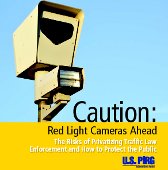Article from: www.thenewspaper.com/news/36/3623.asp
10/27/2011
Study Questions Wisdom of Privatized Law Enforcement
Public interest think tank issues report critical of existing practices for red light camera use.
 An estimated sixty million Americans live in a jurisdiction monitored by an automated ticketing machine. According to a report released today by the left-leaning US Public Interest Research Group (US PIRG), the trend of privatizing law enforcement raises a number of issues that put the public in those areas at risk.
An estimated sixty million Americans live in a jurisdiction monitored by an automated ticketing machine. According to a report released today by the left-leaning US Public Interest Research Group (US PIRG), the trend of privatizing law enforcement raises a number of issues that put the public in those areas at risk.
"Pitfalls can arise when contracts encourage vendors to treat automated traffic enforcement systems as a profit center: by maximizing the number of tickets written, regardless of the impact on public safety; by limiting the ability of governments to set traffic safety policies according to community needs; or by constraining the ability of cities to terminate contracts early in the event that automated enforcement systems are rejected by the electorate or fail to meet safety goals," the study explained.
Under severe budgetary pressures, local jurisdictions often sign contracts with vendors that were presented with a slick marketing campaign. Such deals often contain extremely unfavorable terms. The public is hurt by per-ticket payment systems -- often disguised with "cost neutral" contract language -- that ensure that the system is designed to maximize revenue, not safety. Such provisions provide a monetary incentive to increase the number of tickets issued. That leads to other provisions prohibiting cities from lengthening yellow light duration to improve safety and requiring right on red ticketing and ticket approval quotas.
"Many automated traffic law enforcement contracts create risk by penalizing municipalities or leaving them exposed to costly and disruptive lawsuits in the case of early termination of the contract, leaving taxpayers on the hook even if the camera system fails to meet community objectives," the study noted. "Contract terms that keep municipalities locked in with heavy cancellation fees or threaten them with expensive litigation if they change their minds are not in the best interests of the public."
The report's authors suggested the privatized law enforcement arrangement creates a dynamic where the companies end up lobbying for the creation of more violations. In Florida, for example, red light camera companies employed forty lobbyists at a cost of over $2 million to kill legislation that would have mandated longer yellow signal times and that would have otherwise limited the use of photo ticketing. Both Redflex Traffic Systems of Australia and American Traffic Solutions (ATS) have created front groups to create the appearance that these corporate efforts have "grassroots" support.
The study concluded with recommendations about the way to structure a red light camera program "free from potential conflicts of interest." No such principles are adhered to by any existing photo ticketing program.
A copy of the study is available in a 1mb PDF file at the source link below.
Source: Caution: Red Light Cameras Ahead (US Public Interest Research Group, 10/27/2011)
Permanent Link for this item
Return to Front Page
 An estimated sixty million Americans live in a jurisdiction monitored by an automated ticketing machine. According to a report released today by the left-leaning US Public Interest Research Group (US PIRG), the trend of privatizing law enforcement raises a number of issues that put the public in those areas at risk.
An estimated sixty million Americans live in a jurisdiction monitored by an automated ticketing machine. According to a report released today by the left-leaning US Public Interest Research Group (US PIRG), the trend of privatizing law enforcement raises a number of issues that put the public in those areas at risk.